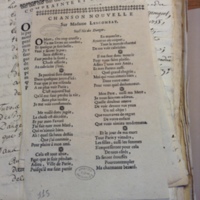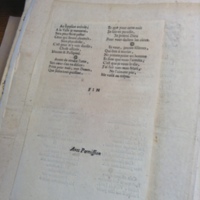Chanson nouvelle sur Madame Lescombat.
Sur l’air du Danger.
Title
Chanson nouvelle sur Madame Lescombat.
Sur l’air du Danger.
Sur l’air du Danger.
Synopsis
On this date in 1755, Henri Mongeot was broken on the wheel for assassinating the husband of his adulterous lover, Marie.
Louis Alexandre Lescombat was a Paris architect; the betrayal of his flighty wife Marie Catherine Taperet was all the talk of Paris after her lover Mongeot slew the husband whilst out on a walk in December of 1754 — then summoned the watch to present a bogus self-defense claim.
This tactic has been known to work when the killer enjoys sufficient impunity; perhaps a respectable bourgeois like Lescombat could have done it to Mongeot — but when the horny 23-year-old busts up the family home with one blade and then the other, it’s La Mort de Lescombat, a tragedy.
For the widow, one good betrayal would deserve another: Mongeot faithfully avoided implicating her in the murder but when he discovered on the very eve of his death that she was already making time with a new fellow, he summoned the judge and revenged himself by exposing her incitement to the crime. His evidence would doom her to follow him many months later, after the sentence was suspended long enough for the widow Lescombat to deliver a son.
Joining Mongeot on the scaffold this date was a 15-year-old heir to the family executioner business apparently conducting just his second such sentence — Charles-Henri Sanson, the famed bourreau destined in time to cut off the head of the king and queen. Mongeot makes a passing appearance in the 19th century Memoirs of the Sansons; in it, Charles-Henri’s grandson remarks from the family notes that “Mdme. Lescombat … was confronted with him [i.e., her doomed lover] at the foot of the scaffold. She was remarkably handsome, and she tried the effect of her charms on her judges, but without avail.”
Louis Alexandre Lescombat was a Paris architect; the betrayal of his flighty wife Marie Catherine Taperet was all the talk of Paris after her lover Mongeot slew the husband whilst out on a walk in December of 1754 — then summoned the watch to present a bogus self-defense claim.
This tactic has been known to work when the killer enjoys sufficient impunity; perhaps a respectable bourgeois like Lescombat could have done it to Mongeot — but when the horny 23-year-old busts up the family home with one blade and then the other, it’s La Mort de Lescombat, a tragedy.
For the widow, one good betrayal would deserve another: Mongeot faithfully avoided implicating her in the murder but when he discovered on the very eve of his death that she was already making time with a new fellow, he summoned the judge and revenged himself by exposing her incitement to the crime. His evidence would doom her to follow him many months later, after the sentence was suspended long enough for the widow Lescombat to deliver a son.
Joining Mongeot on the scaffold this date was a 15-year-old heir to the family executioner business apparently conducting just his second such sentence — Charles-Henri Sanson, the famed bourreau destined in time to cut off the head of the king and queen. Mongeot makes a passing appearance in the 19th century Memoirs of the Sansons; in it, Charles-Henri’s grandson remarks from the family notes that “Mdme. Lescombat … was confronted with him [i.e., her doomed lover] at the foot of the scaffold. She was remarkably handsome, and she tried the effect of her charms on her judges, but without avail.”
Set to tune of...
air du Danger
Transcription
O Mort, t’es trop cruelle,
Tu me livres un combat,
Et quoique je sois belle,
Faut y sauter le pas;
Sans différer,
Faut perdre la santé,
Chose assurée,
Au cabriolet j’irai.
Je partirai sans doute
Dans quelque jours d’ici:
Faut que je me résoude
A ne plus voir Paris;
C’est aujourd’hui
Qu’il me faut perdre la vie,
Sans plus tarder,
Je me vois condamnée.
Me voilà donc jugée,
La chose est décidée,
Et par mon Favori
J’ai fait tuer mon Mari,
Qui m’aimoit bien.
Ah! quel fâcheux destin
Que j’ai commis,
Pour plaire à mon ami.
Cela est tout abus,
Faut que je sois pendue.
Adieu, Ville de Paris,
Puisqu’il me faut partir
En mantelet,
Ayant un air coquet,
Tout le monde charmé
De me voir cabrioler.
Il me faut donc mourir
Pour vous faire plaisir.
Adieu, tous mes Amis,
Et mes Parens aussi.
Quel grand chagrin,
Moi qui vous aimois bien,
Dans votre coeur
Pour vous quel deshonneur.
Mon Pere, aussi ma Mere,
Je vous fais mes adieux.
Quelle douleur amere
De voir devant vos yeux
Un tel objet!
Que vous avez de regret
De votre enfant
Que vous aimiez tendrement.
Et le jour de ma mort
Tout Paris y viendra,
Les filles, aussi les femmes
S’empresseront pour cela
De tous côtés,
Ils seront étouffés
Pour contempler
Ma charmante beauté.
Au supplice arrivée;
A la Ville je monterai,
Sera pour faire pester
Ceux que seront charmés,
Sans plus târder,
C’est pour m’y voir danser,
Chose assurée,
Menuet & Passepied.
Avant de rendre l’ame,
Son coeur s’en va disant:
Priez pour moi, mes Dames,
Que Jesus tout-puissant,
Et que pour cette nuit
Je sois en paradis,
Je prierai Dieu
Pour vous dedans les cieux.
Et vous, jeunes fillettes,
Qui êtes à marier,
Ne prenez point un homme
Et sans que vous l’aimiez;
C’est que je vous le dis,
J’ai fait tuer mon Mari,
Ne l’aimant pas,
Me voilà au trépas.
FIN
Avec Permission
Tu me livres un combat,
Et quoique je sois belle,
Faut y sauter le pas;
Sans différer,
Faut perdre la santé,
Chose assurée,
Au cabriolet j’irai.
Je partirai sans doute
Dans quelque jours d’ici:
Faut que je me résoude
A ne plus voir Paris;
C’est aujourd’hui
Qu’il me faut perdre la vie,
Sans plus tarder,
Je me vois condamnée.
Me voilà donc jugée,
La chose est décidée,
Et par mon Favori
J’ai fait tuer mon Mari,
Qui m’aimoit bien.
Ah! quel fâcheux destin
Que j’ai commis,
Pour plaire à mon ami.
Cela est tout abus,
Faut que je sois pendue.
Adieu, Ville de Paris,
Puisqu’il me faut partir
En mantelet,
Ayant un air coquet,
Tout le monde charmé
De me voir cabrioler.
Il me faut donc mourir
Pour vous faire plaisir.
Adieu, tous mes Amis,
Et mes Parens aussi.
Quel grand chagrin,
Moi qui vous aimois bien,
Dans votre coeur
Pour vous quel deshonneur.
Mon Pere, aussi ma Mere,
Je vous fais mes adieux.
Quelle douleur amere
De voir devant vos yeux
Un tel objet!
Que vous avez de regret
De votre enfant
Que vous aimiez tendrement.
Et le jour de ma mort
Tout Paris y viendra,
Les filles, aussi les femmes
S’empresseront pour cela
De tous côtés,
Ils seront étouffés
Pour contempler
Ma charmante beauté.
Au supplice arrivée;
A la Ville je monterai,
Sera pour faire pester
Ceux que seront charmés,
Sans plus târder,
C’est pour m’y voir danser,
Chose assurée,
Menuet & Passepied.
Avant de rendre l’ame,
Son coeur s’en va disant:
Priez pour moi, mes Dames,
Que Jesus tout-puissant,
Et que pour cette nuit
Je sois en paradis,
Je prierai Dieu
Pour vous dedans les cieux.
Et vous, jeunes fillettes,
Qui êtes à marier,
Ne prenez point un homme
Et sans que vous l’aimiez;
C’est que je vous le dis,
J’ai fait tuer mon Mari,
Ne l’aimant pas,
Me voilà au trépas.
FIN
Avec Permission
Method of Punishment
hanging
Crime(s)
murder
Date
Execution Location
Paris, Place de Greve
URL
https://fr.wikipedia.org/wiki/Marie_Catherine_Taperet
Collection
Citation
“Chanson nouvelle sur Madame Lescombat.
Sur l’air du Danger.,” Execution Ballads, accessed February 26, 2026, https://omeka.cloud.unimelb.edu.au/execution-ballads/items/show/1184.
Sur l’air du Danger.,” Execution Ballads, accessed February 26, 2026, https://omeka.cloud.unimelb.edu.au/execution-ballads/items/show/1184.


